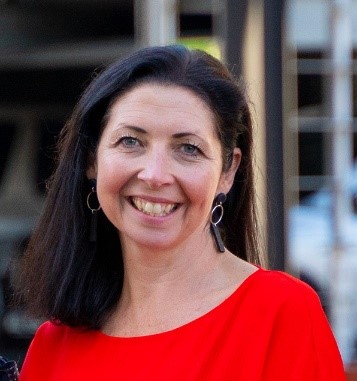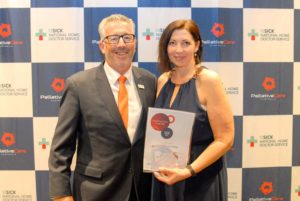2017 National Palliative Care Award winners… where are they now? Anna Holliday
2017 National Palliative Care Award winners… where are they now? Anna Holliday
Monday, September 02, 2019
Next up in our "Where are they now" series we catch up with Anna Holliday, Project Manager at Li-Ve Tasmania and the winner of the Emerging Leader category at the 2017 National Palliative Care Awards.
Anna will be attending next week's Oceanic Palliative Care Conference in Perth where the 2019 winners will be announced.
You received Palliative Care Australia’s Emerging Leader Award in 2017. What did winning the award mean to you?
I was not aware that I had even made it to the finalist stage, so winning the Palliative Care Australia Emerging Leader award on the night was such a wonderful surprise! In fact, the significance of winning this Award still resonates with me very strongly. I highly value Palliative Care Australia and its work, so winning the award that was an extremely humbling recognition of my personal commitment to enhancing the opportunities and experiences for people with disability at the end of life.
However, more importantly, the award reinforced that the Palliative Care sector in Australia values the need for equity at the end of life for all Australians. To me (and many Australians) it symbolised a strong and timely commitment to improving the systems, culture and practices across our community to ensure that people with disability die well.
As a direct result of the Award, I was contacted by a range of clinicians, researchers, people living with disability and those who support them (nationally and internationally). Many of those contacts expressed their gratitude for raising awareness for the needs of people living with disability at the end of life, but were also seeking advice and support to enhance their own personal, professional or organisations capacity to deliver high quality genuinely inclusive care at the end of life. Some of those contacts resulted in significant opportunities for me to learn more about the evidence based work that aligns with my interest areas and consider how I can embed improvements into the disability sector, an opportunity I will always be grateful for.
I am very grateful for this recognition resulting from the Palliative Care Australia Emerging Leader award, and for the opportunities it has created for people living with disability.
What do you think makes a good leader in palliative care?
To me, a good leader in Palliative Care is a person who leads with clarity and honesty, listens with heart, has an appreciation for collaborative working and a strong commitment to their cause. It is someone who is adaptable, can recognise strengths, is resilient to challenges and is opportunistic. It is someone with an infectious enthusiasm towards learning and improving, and ultimately, for changing the landscape of palliative care in a manner than benefits the maximum number of people.
Can you tell us where you are currently working and/or your current career focus?
I am employed by Li-Ve Tasmania, a leading disability service in Tasmania. My role is Project Manager for a range of initiatives, primarily the Palliative Care project area. Li-ve Tasmania has extensive experience working collaboratively with others and is proud to have a secure profile as a leading service provider for people with disability in the end-of-life care domain on local, national and international levels. Within the Tasmanian community, Li-Ve Tasmania currently leads a range of initiatives focused on enhancing end of life care and bereavement outcomes for people with disability, namely the Li-Ve Ability program.
The Li-Ve Ability program consists of three components:
- Recognition and value for the voice of lived experience: People with disability focus: This service area is aimed at generating social change that results in people with disability being recognised for their contributions to treatment planning and end-of-life care discussions, being appropriately supported in their experiences of grief and loss. It involves working collaboratively with people with disability to develop resources. Further, it empowers them to take leadership roles within their communities as champions of this topic.
- Strengthening informal support networks: A families and carers focus: For the families (including siblings) of people with disability who are dying and/or bereaved, this strategy focuses on developing mechanisms to enhance support services and also the connections to these services. It also focuses on strengthening the roles and relationships between families and carers, and their loved ones.
- Building capacity and capability in our community: A Disability and community sector focus: As part of my role (and candidature for a Master’s Degree), I am leading a study of a sector capacity and capability building project, the Li-Ve Healthy End of Life Program: A research collaboration between Li-Ve Tasmania, University of Tasmania and LaTrobe University Palliative Care Unit. The first of its kind in Australia, this study considers the Healthy End of Life Program (HELP) amidst a suite of organisational support strategies. These strategies include experiences, tools and expert coaching tailored for an organisation and designed specifically to guide organisations to embed a healthy approach to the end of life care for the people they support. Li-Ve Healthy End of Life Program will ultimately improve the way people with disability experience the end of life.
Li-Ve Healthy End of Life Program also measures the value and capacity of existing tools and resources to achieve improved outcomes for people with disability at the end of their life. Preliminary analysis reveals this model to be a sustainable approach to enhanced individual and organisational capacity enhancements.
What do you enjoy most about your role?
This one is really easy because there are so many things I love about my current role!Fundamentally, I really love that my work is recognising the expertise of people living with disability and those who support them. It is building capacity for individuals with disability to understand their rights at the end of life, enhance their ability to contribute to conversations about their own treatment plans and care arrangements. Simultaneously, my role gives me the opportunity to recognise and share the value and expertise within the disability sector workforce. My research and project activity is strengthening the capacity and capability of the disability industry to lead on the provision of end of life care for people with cognitive and/or intellectual disability. This is significant change for people with disability, and in fact, the broader community. Change that is meaningful and sustainable. What’s not to love?!
Finally, I am really grateful for the focused and continuing support from my employer, Li-Ve Tasmania, and the partners in my work particularly the Latrobe University Public Health Palliative Care Unit University of Tasmania.
What goals would you like to see for the future of palliative care in Australia? I look forward to any initiatives that will influence the outcomes and experiences of people living (and dying) with disability. Namely, strategies that will ensure that the needs of disadvantaged populations (such as people living with disability) are recognised and responded to in a timely manner, that these individuals are genuinely included and have opportunity to contribute to palliative care service design, participate in their own treatment plans and are seen for their valued contributions to community. I think a public health approach to palliative care is essential and look forward to this being a feature of the palliative care sector’s approach more consistently in the future.
Are you attending 19OPCC – if so what sessions are you most looking forward to?
Absolutely! I am really looking forward to 19OPCC! Trying to select which sessions I am most excited about is really tricky as there are so many diverse and fabulous offerings! Alongside the sessions, I am really looking forward to the chance to just absorb myself in the conference experience to extend my professional knowledge, connections and then bring everything I learn back to community to benefit others!
Register to attend the 2019 Oceanic Palliative Care Conference here


